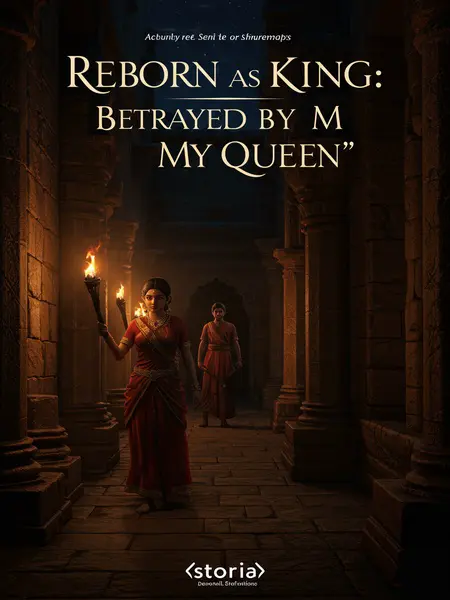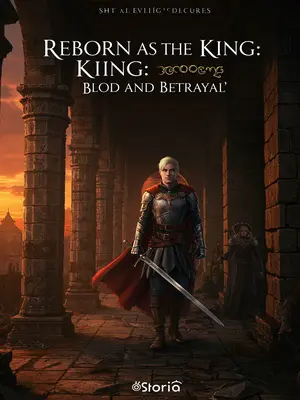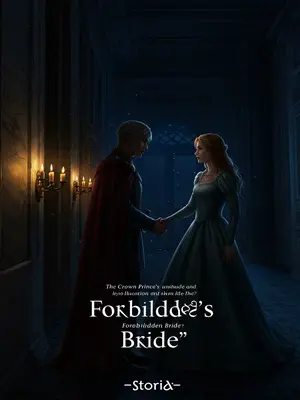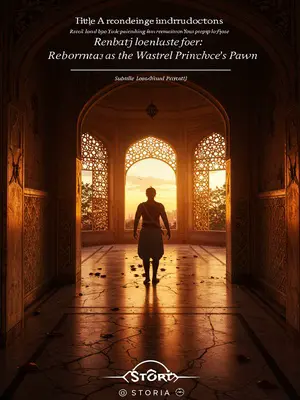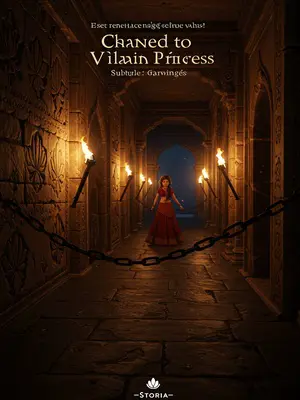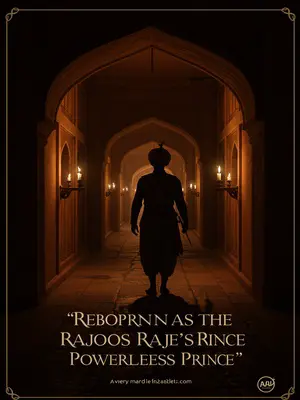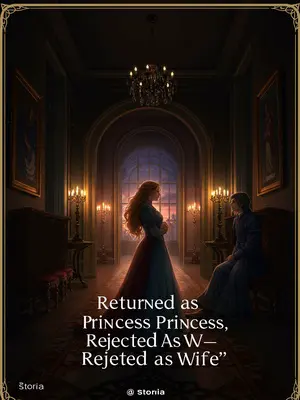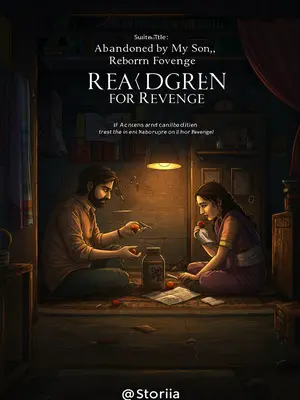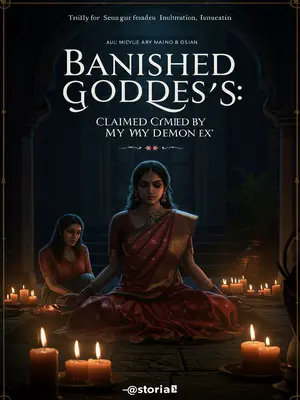Chapter 2: The Lion’s Call
When news of the great defeat at the Narmada reached Ujjain, General Vikram Singh let out a long sigh.
He leaned against the old neem tree in his courtyard, the smell of wet earth rising after the first drops of rain. The tiled roof of his bungalow was patched in places, the garden wild with lantana. The distant sound of conch shells from the Mahakaleshwar temple mingled with the moan of the wind.
In his life, from the north to the Deccan, returning now with grey hair and a haggard face—he once led fifty men into a fifty-thousand-strong enemy camp, captured traitors, and demanded justice…
His hands, once steady as a rock, now shook as he reached for his sword. Yet, the memory of that long-ago midnight charge still burned bright—a tale retold in every akhada and paan shop from Ujjain to the Narmada.
The endless flash of blades, the soaring spirit—all still vivid, but that was forty years ago.
Joy in dreams, waking to sorrow.
Sixty-seven-year-old Vikram Singh looked north, his white hair fluttering in the wind.
The breeze tugged at his angavastram, the scent of rain in the air mingling with the bittersweet memories of lost comrades. He squinted at the distant horizon, eyes moist with unshed tears.
With the west wind blowing, Vikram Singh could sense that something within him faded along with this great defeat. He thought perhaps his old ailments would take advantage, and with nothing left to hope for, he might not have many years left.
He thought of his grandchildren—would they remember him as a lion, or as an old man who watched his country falter?
Centuries later, how would the world speak of me?
Was my life spent on rivers and hills, only drunkenly chanting of wind and moon, and nothing else achieved?
He wondered if, like the wandering bards, his deeds would be reduced to a single couplet, his failures remembered longer than his victories.
Vikram Singh sighed again: "The late autumn wind is truly cold."
He wrapped his shawl tighter, feeling the chill in his bones. Even the old mango tree in the courtyard seemed to droop in sympathy.
He took down the sword hanging on the wall, set aside the letter from afar, his chest filled with countless sorrows and desolation. While he could still wield a blade, he would let his remaining blood flow into the autumn wind.
He placed a trembling hand on the hilt, tracing the ancient engravings—reminders of battles survived and friends lost. For a moment, he was young again, ready to face the world.
But he did not expect that just as he stepped out of the courtyard, urgent hoofbeats sounded outside the gate.
The thundering of hooves shattered the afternoon calm. The gatekeeper, half-asleep in his chair, jerked upright, turban askew.
The gatekeeper had no time to announce; a rider charged in, leaping off the horse with clean movements, and said solemnly to Vikram Singh: "An urgent royal edict, General Vikram Singh, receive the decree."
The rider’s breath steamed in the cold air, his livery splattered with mud from the monsoon roads. The gatekeeper’s jaw dropped; in all his years, he’d never seen such haste in the royal service.
The gatekeeper who followed was stunned and turned to look at Vikram Singh.
Vikram Singh frowned, stepped forward, and said: "I am here."
He straightened his back, ignoring the ache in his knees, the old fire in his eyes rekindling for a moment.
The man showed his badge, saying he was Inspector Ajay, an officer of the Royal City Department, and of course it was His Majesty’s will.
The insignia gleamed in the twilight, the familiar crest catching Vikram’s attention. He nodded slowly, still wary.
Vikram Singh chuckled. He was no gentle courtier; to train the Veer Sena, he dared detain the court’s auditors. In a foul mood today, in old age, he feared nothing.
He let out a dry laugh, the sound rusty from years of silence. "Inspector saab, budha sher apne daant bhoolta hai kya?"
"The king has long neglected state affairs. He still knows I, Vikram Singh, have trained the Veer Sena? Just say it—Pratap Rao wants me to lead troops into the capital, for what purpose?"
Inspector Ajay looked Vikram Singh up and down, then took out a letter: "The king guessed you would doubt, so he wrote this for you."
He handed over the letter with both hands, his posture respectful. The gatekeeper watched, wide-eyed, as if witnessing the start of an epic tale.
Vikram Singh: "…"
No way, does the king know me so well, even predict my reaction?
He snorted, secretly impressed, and broke the seal.
Vikram Singh took the letter, and his face changed dramatically after reading just one line.
[Nikhil in Malwa has rebelled, about to cede four districts, splitting the land as king.]
His grip tightened on the parchment, knuckles whitening. The unthinkable had come to pass.
The Nikhil family had guarded Malwa for three generations—what was Nikhil thinking? Throwing away eighty years of reputation?
He shook his head, disbelief warring with anger. Family honour, it seemed, was no longer what it used to be.
Reading further, Vikram Singh’s eyelids twitched wildly.
[All Mongol tribes are unified, Timur rises in the north. As you once said, when the invaders perish, India’s worries will only increase. Now the invaders have not yet perished, but the great calamity has arrived.]
He felt the words settle like lead in his stomach. His own warnings, ignored for years, now come home to roost.
Damn, only now do you believe me—what were you doing before?
I’m already sixty-seven, how many years do I have left? Can I still sweep away the invaders and stand on the great hills?
A wry smile tugged at his lips. Time was short, but the old spark had not entirely died.
Vikram Singh couldn’t help but grumble inside, but his heart beat ever faster. The old passion and spirit lost in the Northern Campaign’s defeat now surged back into him.
He straightened, feeling the years fall away, just for a moment.
Perhaps it’s too late, but the king finally trusts me.
He closed his eyes, murmuring a quick prayer to Bhairava, his family deity. Even if this was his last battle, he would not go quietly.
When he read the next few lines, Vikram Singh felt even the autumn wind stopped.
The world fell silent; Vikram Singh seemed to see Rohan standing before him, spirit soaring to the heavens, pointing to the rivers and mountains.
[The great calamity is coming, time waits for no one. This Northern Campaign may be rushed, but the Chalukyas can only win, not lose. I will personally go to Malwa to deal with Nikhil and take command of the army. But everyone at court speaks of peace, their vision short-sighted, and will never let me lead a campaign in person.
Of all those who dare, with loyal courage, to slay traitors and save the day among thousands of troops, who but you besides me?
Let the bright moon shine for you, illuminating your icy heart. Now is the time to draw the long sword for ten thousand miles. May I ask, is Bheeshma old, can he still eat?]
He blinked rapidly, the familiar sting of unshed tears blurring the ink on the parchment.
After reading, it was as if the moon had set beyond the western window, washing away a thousand hills.
The night air felt sharper, the world at once vast and intimate, as if the gods themselves listened in.
Vikram Singh held the letter, his vision blurred for some reason. He wiped his eyes and couldn’t help but chuckle softly.
Still, I’m old. Twenty years ago, I would never have cried so easily.
He shook his head, a little embarrassed, but let the tears fall anyway. After all, what did he have left to prove?
After this soft laugh, waves of pent-up emotion surged in Vikram Singh’s chest, pushing him, rushing at him, until his laughter turned into wild, unrestrained laughter.
He threw his head back, laughter ringing out across the courtyard, startling the crows into flight. The gatekeeper dabbed his own eyes with the corner of his dhoti, pretending it was just dust.
He laughed at the king’s audacity and unconventional ways; laughed at himself for waiting a lifetime and finally getting a chance; laughed that all the war strategies were replaced by books on planting mango trees; laughed that old friends were few, those who crossed south with him now buried in the Deccan, never to return home.
Memories tumbled through his mind—the comrades who’d fallen in far-off fields, the jokes shared over cheap country liquor, the promises whispered to the night wind.
So the laughter turned to weeping, echoing across the desolate roads of Kaveripur, reverberating through the hardships of the world. The white-haired old general, holding a letter, stood alone outside the battlefield of his youth, his weeping desolate and sorrowful, lingering for a long time.
Even the stray dogs in the street paused in their nightly quarrels, ears pricked as if in respect.
Inspector Ajay, the decree-bearer, sighed, and the Singh family’s gatekeeper wept along.
After a while, Vikram Singh knelt down, holding Rohan’s letter above his head. He pressed the paper to his forehead in silent thanks, a habit from his soldiering days. He spoke forcefully, each word like gold and jade, venting forty years of frustration.
"I, your humble servant, accept the decree with gratitude!"
His voice rang out, pure and unwavering, carrying to every corner of the old house. The ancestors’ portraits seemed to nod in approval.
He remembered training with Rohan in the dust of the parade ground, the old general’s voice rasping: “Courage, beta, is doing what’s needed when everyone else is afraid.”
At that moment, his granddaughter, in a bright blue frock, tiptoed out and offered him a steaming cup of chai. He smiled at her, the weight of generations pressing gently on his shoulders.
---
During those fifteen days, besides writing to Vikram Singh, Rohan also kept Pratap Rao in line.
He summoned the minister to the study, where the air was thick with the scent of burning camphor and freshly brewed chai. The sound of rain drumming against the latticed windows served as a relentless metronome to the king’s scolding.
Rohan summoned Pratap Rao and gave him a good shouting—scolding him for being unprepared, lacking strategy, scolding him for using the wrong people and harming the people with war.
Every word landed like a slap. Pratap Rao shrank further into his kurta, clutching his files as if they could shield him from royal wrath. The courtiers outside exchanged looks—today the king was in no mood for excuses.
He scolded him so much Pratap Rao doubted his own existence, then threw out the invaders’ peace terms—they demanded Pratap Rao’s death as a precondition.
The air went still, the only sound the faint whistle of the pressure cooker from the distant kitchen.
Pratap Rao: "…"
He looked as if someone had slapped him with a wet towel, his mouth opening and closing without sound.
Pratap Rao: "Am I Arjun Dev now?"
Rohan glared at him, saying if Arjun Dev fought like you, the invaders would never have killed him.
A sharp retort, half-joking but all too true. Even the scribes flinched, ink-stained fingers trembling.
Pratap Rao: "…"
Pratap Rao, desperate, bowed before Rohan in the royal study, saying he had lakhs in family wealth, all of which could be used to reward the army; perhaps they could still fight the invaders at the Narmada.
He folded his hands, voice barely above a whisper, offering up his property like an old zamindar seeking absolution.
Rohan instead smiled, came down and patted Pratap Rao on the shoulder: "It’s useless. Do you know how many officials want to kill you? Do you know the commanders of the palace guards around me have all been bought off?"
The casual gesture—so intimate, so dangerous—sent a chill down Pratap Rao’s spine. He looked up, eyes wide with panic.
Pratap Rao’s vision darkened, feeling finished.
He slumped to the floor, the very image of defeat, as if the palace stones themselves were about to swallow him up.
"Everyone wants to kill, only I pity your ambition." Rohan stood before Pratap Rao and patted his shoulder. "For our kingdom to have someone with your ambition in this half of the country is rare."
Pratap Rao’s nose tingled, almost in tears.
He blinked rapidly, embarrassment and gratitude mixing on his face. Never before had the king spoken to him so directly.
After a while, Rohan poured a cup of chai and handed it to Pratap Rao: "Your head is reserved for now, but if you make another mistake, I’ll drink with you from the golden cup, but the blade will not spare you."
The warm cup rattled in Pratap Rao’s hands. He nodded mutely, understanding that mercy could turn to justice in the blink of an eye.
Pratap Rao was both grateful and fearful.
He sipped the chai, the taste of ginger and threat mingling on his tongue.
After leaving the palace, Pratap Rao was still in a daze, always feeling that the king’s methods of controlling ministers, his every move, truly meant he could finish you off.
He wandered the palace corridors, passing servants who bowed extra low, unsure if they would see him return from his next audience.
The power of life and death seemed naturally his.
This was utterly different from before.
Pratap Rao shivered and thought no more.
He wrapped his shawl tighter, head bowed, as if the very shadows watched him.
During those days, Pratap Rao signed transfer orders, cooperating with Rohan’s plan, and the Veer Sena quietly entered the capital in waves.
Disguised as new recruits and palace gardeners, the soldiers moved into their posts, blending with the crowd at the city’s bustling chowks and in the royal kitchens.
Through the Royal City Department, they infiltrated inside and outside the palace.
Some even took turns serving prasad at the temple, their eyes always scanning, their hands never far from the hilt of a concealed dagger.
The Royal City Department was nominally to guard the royal city, supervise officials, directly under the king, with great authority.
But in reality, it only had investigative power, no authority to arrest or judge. As for the accuracy of their intelligence, generations of kings had soft ears and trusted scholars more.
The clerks sat in their smoky offices, scribbling reports that no one read, gossiping about cricket scores and the rising price of wheat, their importance all but forgotten.
Over time, the department was filled with useless people, and no one cared about it anymore.
It was said that even the pigeons atop the Royal City Department’s roof knew more secrets than its officers.
Fifteen days later, in the Kaveripur palace, the grand court assembly convened as scheduled.
The rain had finally come, pelting the palace with fat drops, drenching the crowds that had gathered outside to hear rumours of the king’s new plans.
The weather outside was poor, layers of clouds piling up, about to pour rain at any moment.
Inside, lamps flickered as the wind whistled through the stone lattice, the courtiers shivering in their damp silks.
A servant entered quietly, refilling the king’s brass lota with water, his hands trembling.
Rohan sat on the throne, his face neither sad nor happy, raising his hand: "War or peace, how to fight or negotiate, let’s discuss."
The gold-embroidered cushions beneath him felt cold and hard, a reminder that comfort had no place in times of crisis.
Mr. Sharma signalled the Ministry of Revenue, and someone immediately stepped out, listing the costs of war, saying that even if the front won, the treasury would be emptied, rebellion was imminent, and caution was needed.
He spoke in the nasal monotone of a lifelong babu, every rupee weighed and measured, his words trailing like incense smoke in the thick air.
"We can’t win. The military men are all crude and greedy—how could they win?"
"Pratap Rao has ruined the country and the people, he should be executed!"
"Without Arjun Dev’s era, Kailash’s policies are the mature ones."
Arguments ricocheted across the marble walls, echoing off the high ceiling, the tension mounting with each accusation.
Pratap Rao’s face was flushed. He still had some influence; whether the Censorate or the Six Ministries, there were always a few officials to speak for him.
He straightened, desperately seeking eye contact with his dwindling supporters, clinging to their sympathy as a drowning man clings to driftwood.
Rohan just sat quietly on the throne, his cold gaze sweeping the ministers, memorising every reaction and face.
His eyes lingered on each man a fraction longer than necessary, making even the most confident quail.
Thunder rumbled outside; heavy rain was about to fall.
A sudden gust rattled the glass lanterns, a prelude to the downpour.
Rohan raised his hand, stopping the debate. He directly asked Mr. Sharma: "Minister Sharma, you have a scholarly family background. Why are you silent today?"
A hush fell as all eyes turned to Sharma, who dabbed at his brow with a silk handkerchief, suddenly acutely aware of the sweat staining his collar.
Mr. Sharma stepped forward and bowed: "Maharaj need not worry. Though our kingdom is not yet a match for the invaders, we have won a few battles, showing the enemy is not what they were. Maharaj has probed their strength; now is the time to endure humiliation for the state, as a wise king should."
He spoke with the oily smoothness of a Delhi lawyer, his voice sliding from one argument to the next, trying to wrap Rohan in the soft chains of compromise.
Rohan also smiled, surveying the ministers: "Do you all agree?"
He let his words hang, an invisible net cast across the hall.
Except for Pratap Rao’s small group, the hall responded in unison.
All praised the wise king.
They chorused the words, their voices trembling more from fear than conviction.
Rohan still smiled, flipping through the letters on the table: "Do you all know the invaders’ terms are to call us uncle and nephew, increase tribute, cede territory, and kill Pratap Rao?"
He held up the parchment, the king’s seal glaring crimson in the lamplight, every syllable heavy as lead.
Mr. Sharma immediately stepped forward, speaking forcefully: "For the kingdom, why would the minister mind losing his head?"
He bowed so low his forehead almost brushed the cold marble. The words sounded noble, but everyone knew they were empty.
Those already swayed by Mr. Sharma stepped out, their voices shockingly unified, echoing in Pratap Rao’s ears like thunder.
"Why would the minister mind losing his head!"
The air was thick with hypocrisy, the words bouncing off the walls like a mantra at a fake satsang.
Pratap Rao was dazed, nearly fainting.
He clutched the edge of the table, vision swimming, the ground tilting beneath his feet.
When he came to, he heard rain outside—the thunder was real.
The storm had arrived, hammering the tiles with a fury that matched the king’s mood.
Pratap Rao was utterly hopeless. Court struggles were like military defeat; even with the king’s support, what use was it?
His spirit drained out of him, puddling on the floor like the rainwater seeping through the cracks in the window.
"I understand."
Rohan’s voice cut through the clamour like a sword.
In the pouring rain, Pratap Rao heard the king’s voice.
He couldn’t help but look up at him.
The king sat upright, face set in an expression that brooked no dissent.
Rohan’s face was half-smiling, staring at Mr. Sharma: "I understand. You all want to negotiate peace with the invaders, with plenty of high-sounding reasons. Either enduring hardship or for the people, but I just don’t understand—what justification do you have?"
He let the words hang, challenging every man to find the courage to answer.
As he finished, Rohan’s smile vanished, his voice hitting the ground like it could shatter the marble floor.
The temperature in the hall seemed to drop; even the flames of the oil lamps flickered, as if cowed by his anger.
Mr. Sharma’s breath caught, his heart pounding. He thought: No, no, I know the king too well—how could he roar like a lion?
But he had no time to react.
Rohan suddenly stood up, pointing at the ministers and shouting:
"When the Raja is humiliated, ministers die! You fellows all have your reasons, but why has no one died for me before this hall?"
His voice rang out like a conch at war, reverberating off the painted ceiling.
"Peace, peace—I’m the king, yet to see a mere envoy I have to go down myself, bow to receive his letter, and the amount of tribute depends on his damn face. Am I still the king? If you can’t stand for your king, better go home and let your wives run the court. At least they have some guts."
He glared at the assembly, daring anyone to answer.
"When the Raja is humiliated, ministers die! If you don’t summon your remaining courage to fight the enemy, you should all kill yourselves here—what more is there to say!"
The silence was total, broken only by the rain hammering against the windows and the thunder rolling over the city.
The ministers all turned pale, their faces falling like someone had poured cold lassi down their backs. Only Mr. Sharma’s pupils contracted, catching Rohan’s meaning.
He clutched his shawl tight, sweat beading at his temples.
The king doesn’t want peace.
But if he doesn’t, will he wait for the invaders to take Kaveripur?
If not, how can Mr. Sharma keep power?
He licked his lips, calculating, eyes darting from Rohan to the guards stationed by the doors.
Mr. Sharma gritted his teeth. Before Rohan finished, he strode forward three steps, shouting louder: "Inspector Kunal! The king is ill—shouldn’t you urge him to rest?"
The accusation hung in the air. A ripple of unease ran through the guards.
Inspector Kunal shuddered, looked at Mr. Sharma, then at Rohan.
He hesitated, torn between old loyalties and new ambitions.
There were still loyal ministers in the hall. Even among the peace faction, the Grand Pandit Prakash stepped out, pointing at Mr. Sharma and cursing: "Traitor! Do you intend rebellion?"
His voice cracked, but the conviction in it rang true. A handful of courtiers murmured agreement, emboldened by his courage.
At this point, there was no turning back. Mr. Sharma gritted his teeth: "The kingdom is ruled by scholars. Today, all are here. With Commander Kunal, what is there to fear?"
He gestured broadly, inviting the rest of the court to join him. Some shifted nervously, others looked down, their courage draining away.
Inspector Kunal looked around; except for Prakash and a few, all ministers lowered their heads, clearly agreeing with Mr. Sharma.
He made his decision, drawing his sword with a practiced flourish.
The rain outside sounded like stones falling on green hills, making Inspector Kunal dizzy.
He remembered Mr. Sharma and Rani Ananya’s promises of a glorious future. His eyes turned ruthless.
Rohan looked at him coldly: "Commander Kunal, have you decided?"
He cocked his head, a sardonic smile tugging at his lips.
Inspector Kunal suddenly drew his sword: "Please, Maharaj, return to rest."
As the sword was drawn, Inspector Kunal’s men surged forward. Surrounded by dozens, Rohan did not retreat but advanced, forcing his way to a guardsman and shouted:
"I am the Raja. Do you dare bear the crime of regicide?"
The words hit the guards like a thunderbolt. Even the bravest flinched, uncertain.
His words roared like a lion, stunning the ministers.
Mr. Sharma was dumbfounded: Is there a king who isn’t afraid of death?
The thought flashed through the minds of everyone in the hall: only a madman—or a true king—could look death in the eye so calmly.
While all were shocked, Rohan snatched a sword, the blade flashed, and blood splattered three metres, a head flying into the air.
The metallic tang of blood filled the room. For a moment, the rain seemed to hush, as if paying homage to the fallen.
Except for the rain, the hall was silent.
Every eye was fixed on Rohan, awe and terror mingling in equal measure.
Including Pratap Rao, the ministers looked at Rohan as if seeing a god descend, awe-inspiring.
He stood alone, blood on his arm, his eyes bright with conviction. For the first time in years, the ministers felt what it was to stand in the presence of a true king.
Rohan, covered in blood, full of spirit, his gaze sweeping all, alone suppressed dozens of guards who dared not advance.
He straightened his shoulders, the blood on his hand an unspoken warning.
"Men."
He spoke the word quietly, and it cut through the tension like a knife.
With Rohan’s calm order, Mr. Sharma panicked.
He staggered back, grabbing at his throat as if he could keep his heart from leaping out of his chest.
Mr. Sharma’s face was ashen, lips trembling. He knew he had bet wrong. He never expected the timid king to suddenly display the might of the old emperors.
A cold dread settled on his shoulders, heavier than any cloak of state.
Mr. Sharma shouted hoarsely: "The blades are drawn—retreat and you die!"
Inspector Kunal’s face twitched, realising the situation.
He glanced around wildly, sweat pouring down his face.
Footsteps, sword-drawing, shouting—all chaotic. Pratap Rao, Prakash, and others rushed to stop the rebels; more hid aside, trembling.
The scene erupted in confusion—a chaos of silk and steel, of oaths shouted and alliances broken.
In the chaos, Rohan stood with sword in hand, unmoving.
He was an island of calm in a sea of madness, his gaze never wavering.
Three or five rebels approached, swords raised to strike, but Rohan did not move.
A flash of lightning outside.
The white light painted every face with the look of a demon.
Blood spurted in the hall.
A single scream pierced the tumult, then was silenced by another.
Dozens of harmless-looking attendants moved like leopards, tearing open their outer robes to reveal white underclothes. In the chaos, they had already crept behind the rebels.
With the ease of seasoned warriors, they sprang into action, the glint of their blades catching the lightning’s fire.
As the lightning flashed, a blade cut a throat.
Blood arced across the marble, a red line tracing the fate of traitors.
Even Inspector Kunal had an attendant behind him, a dagger pressed to his back.
He froze, his bravado draining away, the knowledge of his impending death written plain on his face.
Mr. Sharma’s vision darkened, with only one thought.
It’s over.
His entire clan was doomed.
The thunder following the lightning finally rolled in.
It sounded like the gods themselves roaring in approval of Rohan’s justice.
The thunder turned Pratap Rao’s face red; he was invigorated, full of spirit, and knelt, shouting: "Maharaj is divinely wise and brave, with talents beyond compare!"
The courtiers took the cue, rushing forward to kneel in supplication, their voices trembling with both fear and admiration.
The ministers who had just made way for the rebels also came to their senses, kneeling one after another.
Chanting divine wisdom and bravery.
The chorus echoed off the stone, a desperate plea for forgiveness, or perhaps just survival.
Rohan, sword lowered, eyes downcast, none dared meet his gaze.
He stood above them all, a solitary figure in a hall full of supplicants.
Inspector Kunal was drenched in cold sweat. As a soldier, he knew he would die and shouted: "Let Maharaj know, I have troops outside the palace. The outcome is not yet decided."
He tried to summon bravado, but his voice broke halfway through.
Rohan smiled: "Is that so?"
The smile was cold, the promise of swift retribution.
Inspector Kunal looked at Rohan’s smile, his hair standing on end.
He swallowed hard, suddenly wishing for even a moment of mercy.
Grand Pandit Prakash’s eyes lit up. He said: "Maharaj, I have a student, only twenty, but his eyes see through everything. He recently found many oddities in the city, reported to the authorities, and the rebels are not to be feared."
His voice rose, pride and hope mingling in every word.
Rohan frowned, sensing complexity.
He leaned forward, interested despite the chaos.
Inspector Kunal calmed down, smiling at Prakash: "Your student, is he called Surya? He came to me, warned me of spies in the Royal City Department, and I believed him."
He tried to regain the upper hand, but the tremor in his voice gave him away.
Inspector Kunal turned to Rohan: "If Maharaj brought elite troops into the capital, mixed in with the Royal City Department, they can’t be relied on now."
Prakash was shocked, face pale, looking at Rohan, not knowing what to say.
He stammered, caught between admiration and terror.
Rohan raised his eyebrows, finding it interesting, and laughed: "So it’s Surya."
He let out a low, approving chuckle. The future would not lack for clever minds, at least.
Inspector Kunal steadied himself, Mr. Sharma calmed as well.
Yes, the outcome wasn’t decided yet.
For a heartbeat, hope flickered again in their eyes.
Mr. Sharma also laughed: "Thanks to Surya. Even if Maharaj issued secret orders, with the guards watching the Royal City Department, who would dare break out and spill blood in the streets?"
He tried to sound confident, but his voice cracked on the final word.
Inspector Kunal, hearing this, was not worried at all. He raised his eyebrows: "The troops Maharaj brought must be few. Even your trusted ministers, are they bold enough to win against many with few?"
He gestured to the windows, where distant shouts could be heard through the rain.
"Maharaj, why not return to rest?"
The question hung in the air, almost an invitation to surrender.
Rohan, sword in hand, looked at Inspector Kunal. Inspector Kunal tried to smile, but suddenly a blade flashed.
The movement was so swift, so sure, it seemed almost inevitable.
Rohan raised his hand, the blade like lightning, plunging into Inspector Kunal’s chest.
A single cry, then silence.
Inspector Kunal screamed and fell, ministers shocked, rain pouring outside. Rohan looked at Mr. Sharma, eyes like lightning, voice like thunder: "You guessed right. My trusted minister is indeed bold and loyal. As for whether he can win against many with few, if he could break through fifty thousand enemy troops, can he not break through a few thousand guards?"
The words rang like a prophecy, a declaration of war.
Torrential rain, thunder and lightning, Mr. Sharma’s throbbing temples saw the elite disguised as attendants.
He realized, too late, that the game was lost before it even began.
These elites were all dressed in white.
Their uniforms gleamed like fresh jasmine garlands, a symbol of mourning and purity alike.
A line of verse pierced Mr. Sharma’s mind.
The Narmada mourns, the west wind is cold, all in white like snow.
(Note: This line references the famous lament for fallen warriors, evoking the image of soldiers in white, signifying both mourning and resolve.)
The poetry of defeat was all that remained to him.
Mr. Sharma cried out: "Vikram Singh! It’s Vikram Singh’s Veer Sena!"
His voice broke, half in terror, half in awe.
"It is I."
Countless raindrops fell on blood-stained armour, and an old general from the north, hair white at the temples, strode in.
The doors banged open, and through the sheets of rain, Vikram Singh entered, sword drawn, the legend now become reality once more. Every eye turned to him, hope flickering anew in the darkest hour.
The smell of wet earth and blood mixed in the air, heavy as the monsoon clouds above. Vikram Singh’s sword flashed in the lamplight. The fate of the kingdom would be decided before the next sunrise.
